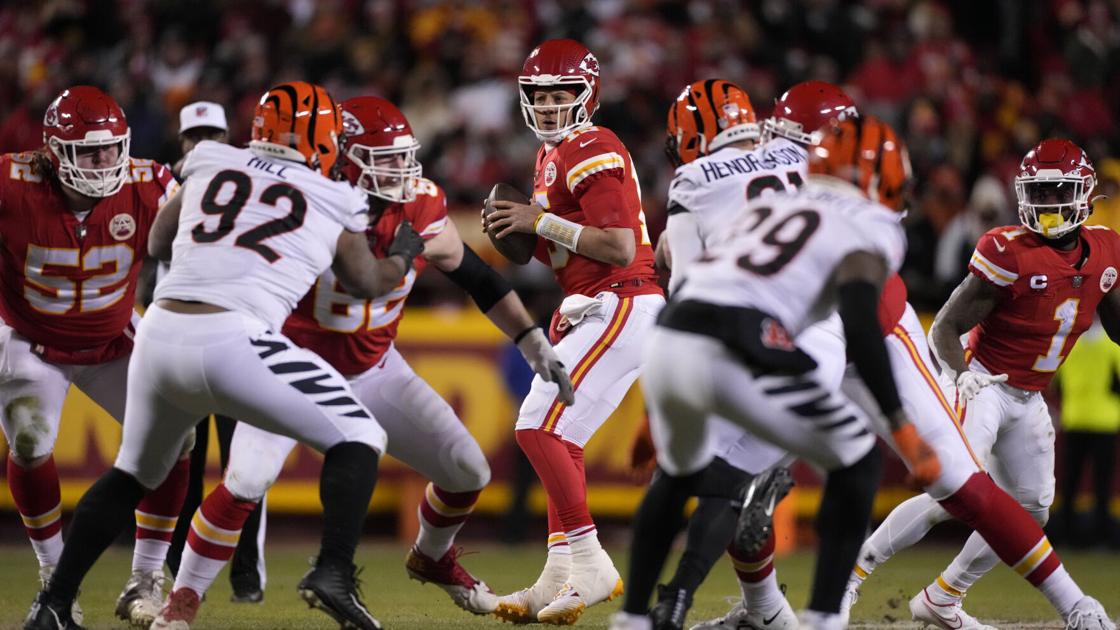Super Bowl features matchup of 1st and 2nd team All-Pro QBs
It’s only fitting that the top two quarterbacks in the regular season based on All-Pro voting are the last two quarterbacks standing in the NFL this season.
First-team All-Pro quarterback Patrick Mahomes will take his Kansas City Chiefs into the Super Bowl against second-team All-Pro Jalen Hurts and the Philadelphia Eagles.
This marks the seventh time since the merger that the first-team All-Pro quarterback will face the second-teamer for the championship, with it last happening in the 2016 season when second-teamer Tom Brady’s Patriots beat first-teamer Matt Ryan’s Falcons 34-28 in overtime.
That’s been the pattern in all six of the matchups, with the second teamer coming out victorious each time: Drew Brees over Peyton Manning in the 2009 season, Mark Rypien over Jim Kelly (1991), Joe Montana over Dan Marino (1984), Montana over Ken Anderson (1981), and Roger Staubach over Bob Griese (1971).
People are also reading…
Both Mahomes and Hurts are among the five finalists for the MVP award that will be announced next week. The winner of the AP NFL MVP hasn’t won the Super Bowl since Kurt Warner did it for the Rams in the 1999 season. The last eight MVPs to play in the game all ended up losing.
Mahomes will be starting in his third Super Bowl at the young age of 27 years, 148 days — 39 days younger than Brady in the 2004 season when he became the youngest QB to start in three Super Bowls.

Eagles quarterback Jalen Hurts is pushed out of bounds by 49ers safety Talanoa Hufanga during the NFC Championship game on Jan. 29.
Hurts is set to start his first Super Bowl at age 24, joining Mahomes and six others to do that before turning 25.
This will be the third Super Bowl with both starting QBs younger than 28, with Brett Favre (27) beating Drew Bledsoe (24) in the game following the 1996 season and Jim McMahon (26) besting Tony Eason (26) following the 1985 season.
Blowouts
The Eagles got to the Super Bowl behind a pair of lopsided wins, which bodes well for their chances to win it all based on past history.
Philadelphia followed up a 38-7 win over the Giants in the divisional round with a 31-7 win over the 49ers in the NFC title game.
The Eagles became the fifth team to win their divisional round and conference championship games by at least 20 points. The other four teams all followed it up with a Super Bowl victory, with San Francisco doing it in 1988 and ’89, Chicago in 1985 and Pittsburgh in 1978.
The Eagles also became the 11th team to allow seven or fewer points in back-to-back playoff games in the season, with the 2000 Ravens the most recent to do it before Philadelphia. Seven of the previous 10 won the Super Bowl that season.
The only team to do it three straight games in a single postseason was the Chiefs on the way to their first Super Bowl title in the 1969 season.
Old-man Johnson
The well-traveled Josh Johnson finally got his first playoff opportunity in some unfortunate circumstances.
The 36-year-old Johnson has spent time with 14 NFL organizations since being drafted by Tampa Bay in 2008 and played in three different spring leagues.
Johnson got forced into action for San Francisco after Brock Purdy injured his elbow on the opening drive of the NFC title game.
Johnson went 7 for 13 for 74 yards and lost a fumble before being knocked out on the first drive of the third quarter with a concussion. He became the third-oldest player at the time of his first postseason pass, with only 40-year-olds Josh McCown and Sonny Jurgensen waiting longer.
The concussion for Johnson led to Purdy going back into the game despite not being able to throw the ball more than 5 or 10 yards.
San Francisco threw the ball only 18 times in the 31-7 loss, marking only the fifth time in NFL history a team lost a playoff game by at least 20 points while throwing fewer than 20 passes.
Streaks snapped
The Bengals and 49ers each came into the conference title games on impressive streaks, with San Francisco having won 12 in a row and Cincinnati 10 straight.
Both got snapped on Sunday.
Before this year, 10 teams had taken winning streaks of at least 10 games into the conference title game, with eight coming out victorious.
The only teams to lose before the Bengals and 49ers were the 2004 Steelers (15 straight) and the 1976 Steelers (10 straight).
For all the latest Sports News Click Here
For the latest news and updates, follow us on Google News.

